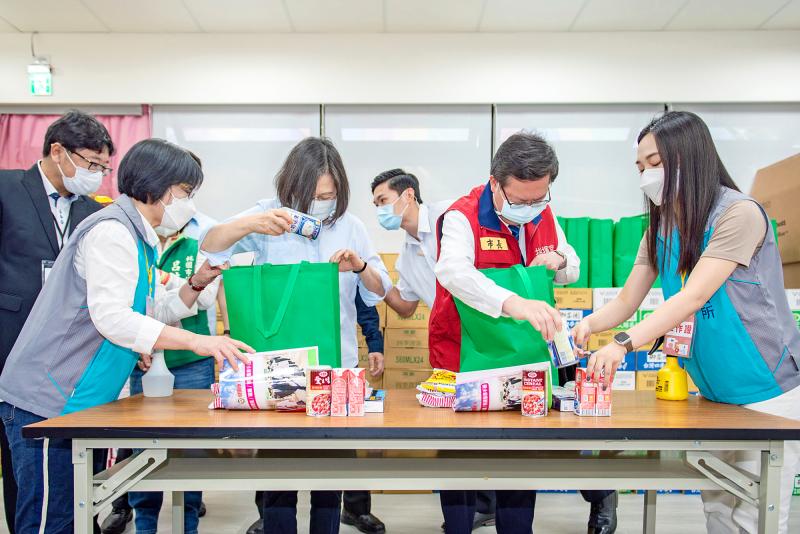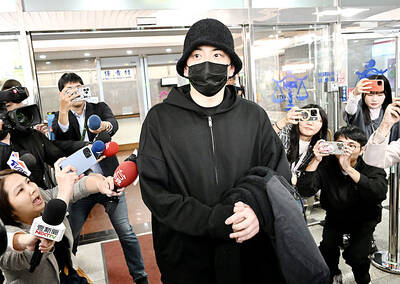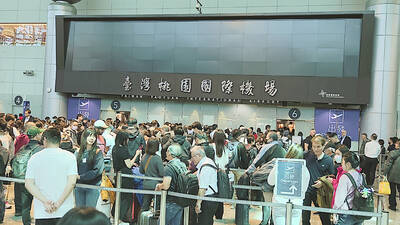The Taiwan Public Opinion Foundation and the Asia-Pacific Elite Interchange Association yesterday released separate polls on Taiwanese satisfaction with President Tsai Ing-wen’s (蔡英文) governance over the past six years.
About 63.9 percent of respondents said that coexisting with COVID-19 is a suitable policy for Taiwan, 11.5 percent preferred the “zero COVID” model adopted by the Shanghai City Government and 24.6 percent declined to provide an answer, the association’s poll showed.
The poll also showed that 48.3 percent of respondents were confident that Tsai is handling cross-strait relations appropriately, while 36.1 percent said that they lacked confidence in her approach.

Photo courtesy of the Taoyuan City Government
Overall, the poll showed that 49.2 percent of respondents were satisfied with the governance of the Tsai administration, while 29.1 percent expressed dissatisfaction.
The association’s poll was conducted on Wednesday and Thursday, interviewing 1,073 adults in telephone interviews after calling randomized landline numbers.
It has a confidence level of 95 percent and a margin of error of 2.98 percentage points.
The association’s poll was weighted based on gender, age and region.
Taiwan Thinktank member Tung Li-wen (董立文) said that she was impressed by the Tsai administration’s ability to maintain high satisfaction ratings, even amid unprecedented political, economic and military turmoil.
The foundation’s poll separately showed that 26.8 percent of respondents were “extremely satisfied” with the performance of Tsai’s administration, 16.5 were “satisfied,” 23.1 percent were “ambivalent,” 13.1 percent were “moderately dissatisfied” and 16.2 percent were “extremely dissatisfied.”
In descending order, 56.7 percent were satisfied with the performance of the administration’s foreign relations, 51.1 percent were satisfied with national defense, 49.5 percent were satisfied with cross-strait policies, 47.3 percent were satisfied with economic performance, 42.4 percent were satisfied that Taiwan had developed its own COVID-19 vaccine and 37.3 percent were satisfied with the administration’s judiciary reforms, the foundation’s poll showed.
Measuring dissatisfaction, 48.5 percent cited Taiwan’s vaccine development, 44.8 percent said economic performance, 43.9 percent said judicial reforms, 39.2 percent said cross-strait policies, 35 percent said national defense policies and 33.9 percent said foreign relations, it showed.
The foundation said that 46 percent supported Tsai’s handling of national affairs, while 40 percent were unhappy in that regard.
The narrow difference of 6.7 percentage points between the national affairs numbers should be a warning for the administration, the foundation said.
The foundation’s poll was conducted on Monday and Tuesday, interviewing people aged 20 or older via telephone.
It obtained 1,077 valid responses and has a 95 percent confidence level with a margin of error of 2.99 percentage points.

The National Immigration Agency (NIA) said yesterday that it will revoke the dependent-based residence permit of a Chinese social media influencer who reportedly “openly advocated for [China’s] unification through military force” with Taiwan. The Chinese national, identified by her surname Liu (劉), will have her residence permit revoked in accordance with Article 14 of the “Measures for the permission of family- based residence, long-term residence and settlement of people from the Mainland Area in the Taiwan Area,” the NIA said in a news release. The agency explained it received reports that Liu made “unifying Taiwan through military force” statements on her online

A magnitude 5.7 earthquake struck off Taitung County at 1:09pm today, the Central Weather Administration (CWA) said. The hypocenter was 53km northeast of Taitung County Hall at a depth of 12.5km, CWA data showed. The intensity of the quake, which gauges the actual effect of a seismic event, measured 4 in Taitung County and Hualien County on Taiwan's seven-tier intensity scale, the data showed. The quake had an intensity of 3 in Nantou County, Chiayi County, Yunlin County, Kaohsiung and Tainan, the data showed. There were no immediate reports of damage following the quake.

Actor Darren Wang (王大陸) is to begin his one-year alternative military service tomorrow amid ongoing legal issues, the Ministry of the Interior said yesterday. Wang, who last month was released on bail of NT$150,000 (US$4,561) as he faces charges of allegedly attempting to evade military service and forging documents, has been ordered to report to Taipei Railway Station at 9am tomorrow, the Alternative Military Service Training and Management Center said. The 33-year-old would join about 1,300 other conscripts in the 263rd cohort of general alternative service for training at the Chenggong Ling camp in Taichung, a center official told reporters. Wang would first

MINOR DISRUPTION: The outage affected check-in and security screening, while passport control was done manually and runway operations continued unaffected The main departure hall and other parts of Terminal 2 at Taiwan Taoyuan International Airport lost power on Tuesday, causing confusion among passengers before electricity was fully restored more than an hour later. The outage, the cause of which is still being investigated, began at about midday and affected parts of Terminal 2, including the check-in gates, the security screening area and some duty-free shops. Parts of the terminal immediately activated backup power sources, while others remained dark until power was restored in some of the affected areas starting at 12:23pm. Power was fully restored at 1:13pm. Taoyuan International Airport Corp said in a